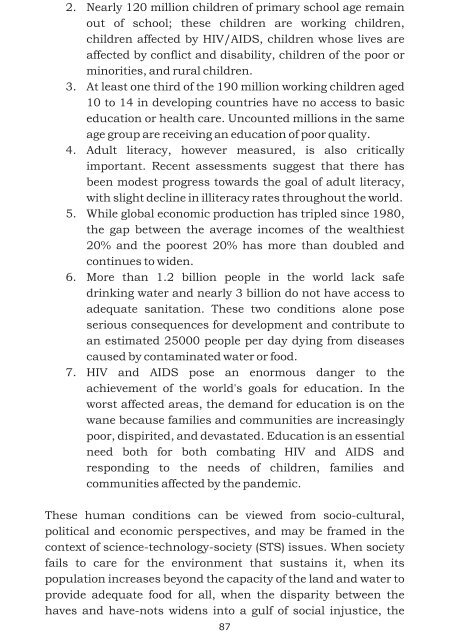Beneficiaries are actors too.pdf - Southern Institute of Peace ...
Beneficiaries are actors too.pdf - Southern Institute of Peace ...
Beneficiaries are actors too.pdf - Southern Institute of Peace ...
You also want an ePaper? Increase the reach of your titles
YUMPU automatically turns print PDFs into web optimized ePapers that Google loves.
2. Nearly 120 million children <strong>of</strong> primary school age remain<br />
out <strong>of</strong> school; these children <strong>are</strong> working children,<br />
children affected by HIV/AIDS, children whose lives <strong>are</strong><br />
affected by conflict and disability, children <strong>of</strong> the poor or<br />
minorities, and rural children.<br />
3. At least one third <strong>of</strong> the 190 million working children aged<br />
10 to 14 in developing countries have no access to basic<br />
education or health c<strong>are</strong>. Uncounted millions in the same<br />
age group <strong>are</strong> receiving an education <strong>of</strong> poor quality.<br />
4. Adult literacy, however measured, is also critically<br />
important. Recent assessments suggest that there has<br />
been modest progress towards the goal <strong>of</strong> adult literacy,<br />
with slight decline in illiteracy rates throughout the world.<br />
5. While global economic production has tripled since 1980,<br />
the gap between the average incomes <strong>of</strong> the wealthiest<br />
20% and the poorest 20% has more than doubled and<br />
continues to widen.<br />
6. More than 1.2 billion people in the world lack safe<br />
drinking water and nearly 3 billion do not have access to<br />
adequate sanitation. These two conditions alone pose<br />
serious consequences for development and contribute to<br />
an estimated 25000 people per day dying from diseases<br />
caused by contaminated water or food.<br />
7. HIV and AIDS pose an enormous danger to the<br />
achievement <strong>of</strong> the world's goals for education. In the<br />
worst affected <strong>are</strong>as, the demand for education is on the<br />
wane because families and communities <strong>are</strong> increasingly<br />
poor, dispirited, and devastated. Education is an essential<br />
need both for both combating HIV and AIDS and<br />
responding to the needs <strong>of</strong> children, families and<br />
communities affected by the pandemic.<br />
These human conditions can be viewed from socio-cultural,<br />
political and economic perspectives, and may be framed in the<br />
context <strong>of</strong> science-technology-society (STS) issues. When society<br />
fails to c<strong>are</strong> for the environment that sustains it, when its<br />
population increases beyond the capacity <strong>of</strong> the land and water to<br />
provide adequate food for all, when the disparity between the<br />
haves and have-nots widens into a gulf <strong>of</strong> social injustice, the<br />
87


